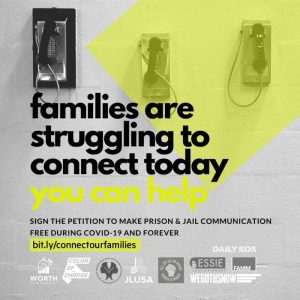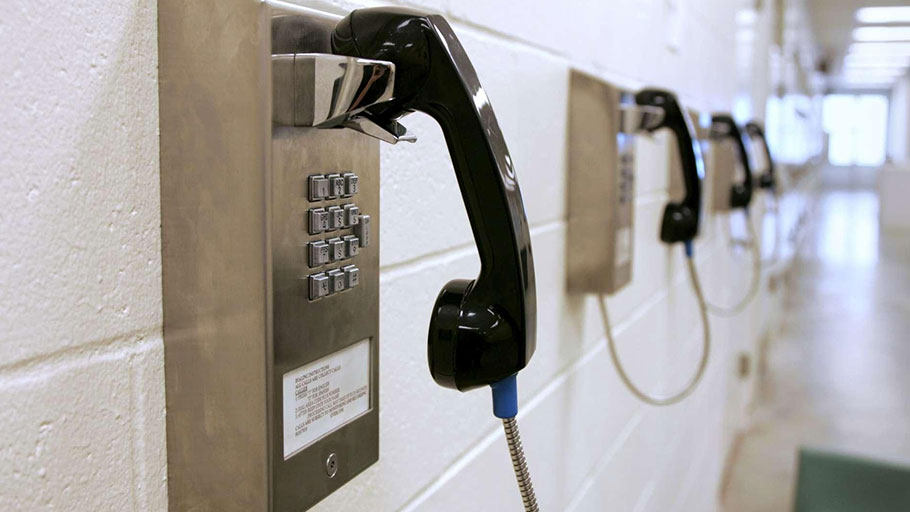By Rebekah Barber, Facing South —

Color of Change and other social justice advocacy groups have launched a petition demanding free phone calls for the incarcerated, an issue that has become even more pressing during the pandemic. (Image from Color of Change’s Facebook page.)
During this time of pandemic-related social distancing, phone conversations are helping people stay sane and connected. But incarcerated people, who are among the most vulnerable to the novel coronavirus, face significant barriers when it comes to accessing phone calls, which are more vital than ever given restrictions on in-person visits.
Prison telecommunications is a $1.2 billion industry dominated by Securus Technologies, headquartered in Carrolton, Texas, and Global Tel Ink, based in Falls Church, Virginia. These corporations could dramatically lower the cost of phone calls for the incarcerated, but they choose not to do so.
Nationally, the average cost of a 15-minute call from jail is $5.74, but it can run as high as $25. It is the loved ones of the incarcerated — disproportionately poor people of color — who typically bear the burden of these costs. Even before the pandemic response caused millions of people to lose their jobs, one-third of families with incarcerated loves ones went into debt trying to maintain communication and visitation with their incarcerated relatives.
Social justice advocacy groups including Color of Change were pressing elected officials to use their power to lower prison phone call fees even before the COVID-19 outbreak, which has made the effort even more urgent. “This pandemic has exposed why these conditions have always been detrimental to the health of our communities — from a physical health standpoint and a mental health standpoint,” Scott Roberts, Color of Change’s senior director of criminal justice campaigns, told Facing South.
The campaign has already won some changes:
- Earlier this year, before the COVID-19 outbreak, commissioners in Dallas County, Texas, decided to amend their contract with Securus Technologies, which rakes in nearly $700 million a year from incarcerated people and their loved ones. Under the previous contract, people held in the county’s jail had to pay 24 cents per minute for calls, plus fees. Now, they have to pay only 1 cent per minute, with no hidden fees. The change makes Dallas County the place with the cheapest phone calls for jailed people nationwide.
- Last month, with the COVID-19 outbreak unfolding, the Federal Bureau of Prisons announced that phone calls would be free during the pandemic for inmates in federal prisons — a relatively small percentage of all those incarcerated nationwide.
- And this week, the Democratic-controlled U.S. House of Representatives passed the Martha Wright Prison Phone Justice Act as part of the latest COVID-19 relief bill. Named for a longtime prison phone justice advocate, the legislation restores the Federal Communications Commission’s (FCC) authority to stop prison phone companies from imposing exorbitant charges, setting rates at 4 cents a minute for regular calls and 5 cents a minute for collect calls. The measure was introduced in response to FCC Chair Ajit Pai reversing an Obama-era rule that limited the cost of prison phone calls to 11 cents per minute. Though the legislation still has to go through the Republican-controlled Senate and will likely face an uphill battle there, its passage in the House is a victory that was years in the making.
Meanwhile, Color of Change is using the growing momentum around the issue to continue to push state representatives, governors, and the FCC to make phone calls free at county jails, state prisons, and detention centers. An online petition sponsored by that group and a number of others urges elected officials to take action to make calls free during this crisis, even if that means using emergency government funds.
“A mother should not have to decide between paying rent and paying for a call between her child and their incarcerated parent,”the petition states.
Source: Facing South
Rebekah Barber is a research associate at the Institute for Southern Studies and writer for Facing South.















